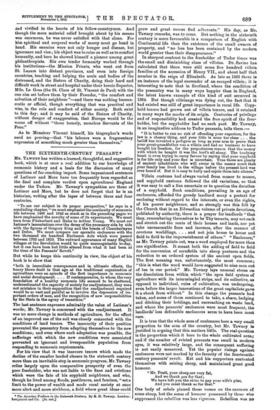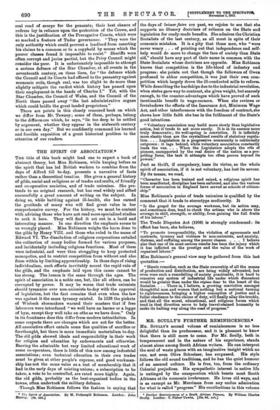THE SIXTEENTH-CENTURY PEASANT.*
Mn. TAWNRY has written a learned, thoughtful, and suggestive book, which is at once a real addition to our knowledge of economic history and a basis for the discussion of many questions of far-reaching import. Some impassioned sentences of Latimer and More have too frequently been regarded as
the final and complete verdict upon agricultural England under the Tudors. Mr. Tawney's sympathies are those of Latimer and More, but he does not forget that he is an historian, writing after the lapse of between three and four centuries.
"To see our subject in its proper perspective," he says in a concluding chapter, " we must emphasize the continuity of economic life between 1485 and 1642 as much as in the preceding pages we have emphasized the novelty of some of its experiments. We must turn from Fitzherbert and Hales to Arthur Young. We must set Latimer's lamentations over the decay of the yeomanry side by side with the figures of Gregory King and the boasts of Chamberlayne and Defoe. We must compare our sporadic enclosures with the two thousand six hundred Enclosure Acts which were passed between 1702 and 1810. The outward appearance of many English villages at the Revolution would be quite unrecognizable to-day, but it can have been but little altered from what it had been at the time of the Peasants' Revolt."
But while he keeps this continuity in view, the object of his book is to show that "both in immediate consequences and in ultimate effects, the heavy blows dealt in that age at the traditional organization of agriculture were an episode of the first importance in economic and social development. . . . If contemporaries, to whom the very foundation of a healthy economic life seemed to be shattered, underestimated the capacity of society for readjustment, they were not mistaken in their supposition that the readjustment required would be so vast and painful as to involve the depression of im- portant orders of men, and the recognition of new responsibilities by the State in the agony of transition."
The last sentence expresses admirably the value of Latimer's words; Mr. Tawney is concerned with the readjustment It was no mere change in methods of agriculture, for the effect of an improved use of the soil was closely connected with the conditions of land tenure. The insecurity of their position prevented the peasantry from adapting themselves to the new conditions; and even where such adaptation was possible, the sufferings with which the new conditions were associated prevented an ignorant and irresponsible population from responding to economic requirements.
For his view that it was insecure tenure which made the decline of the smaller landed classes in the sixteenth century more than an inevitable step in economic progress, Mr. Tawney relies largely upon the comparative prosperity of even the poor freeholder, who was not liable to the fines and evictions which were the fate of his copyhold neighbours, and who, though he lived among floods, pestilences, and famines, "set a limit to the power of wealth and made rural society at once more alert and more stubborn, a field where great ideas could — - — — — — -
• The Agrarian Problem in the Sixteenth Century. By B. H. Tammy. London : Longmans and Co. [9s. net.] grow and great causes find adherents." His day, as Mr. Tawney remarks, was to come. But nothing in the sixteenth century is more favourable in a comparison of English with Continental life than the existence of the small owners of property, and "no loss has been sustained by the modern world greater than their disappearance."
In sharpest contrast to the freeholder of Tudor times was the small and diminishing class of villeins. Dr. Savine has calculated that there were still some five hundred villein families at the accession of Henry VII., and about half that number in the reign of Elizabeth. As late as 1561 there is an instance of the legal surrender of an escaped villein; it is interesting to note that in Scotland, where the condition of the peasantry was in many ways happier than in England, the latest known example of this kind of snit occurred in 1364. But though villeinage was dying out, the fact that it had existed was still of great importance in rural life. Copy- hold tenure had grown out of villein tenure, and it retained in many ways the marks of its origin. Centuries of privilege and of responsibility had created the free spirit of the free- holder, but the copyholder had no such past. Mr. Tawney, in an imaginative address to Tudor peasants, tells them :—
"It is better to run no risk of offending your superiors, for the law is a chancy thing, and your title is none too clear . . . the bailiff has invented a pedigree as long as your arm to prove that your great-grandfather was a villein and had no business to have bought his freedom, for the preposterous reason that the money with which he bought it was the lord's all along. The toadying beast is even trying to curry favour by saying that your copyhold is for life only and your fine is uncertain. True there are plenty of ancient inhabitants who will swear in the manor court that your family has lived in the village before the present lord was ever heard of. But it is easy to bully and cajole them into silence."
Villein customs had always varied from manor to manor,
and copyhold customs followed the old variations, so that it was easy to call a fine uncertain or to question the duration of a copyhold. Such conditions, prevailing in an age of enclosures, afforded the greedy landlord many a pretext for enclosing without regard to the interests, or even the rights, of his poorer neighbours, and so strongly was this felt by the Church that in an Edwardian volume of private devotions, published by authority, there is a prayer for landlords "that they, remembering themselves to be Thy tenants, may not rack and stretch out the rents of their houses and lands, nor yet take unreasonable fines and incomes, after the manner of covetous worldlings, . . . and not join house to house and field to field to the impoverishment of others." "Enclosure," as Mr. Tawney points out, was a word employed for more than one signification. It meant both the adding of field to field for the conversion of cornfields into sheep pastures and the reduction to an ordered system of the ancient open fields. The first meaning was, unfortunately, the most common; "this is what the word would have suggested to nine men out of ten in our period." Mr. Tawney lays unusual stress on the dissolution from within which "the open field system of agriculture with its intermingled strips, and its collective, as opposed to individual, rules of cultivation, was undergoing,
even before the larger innovations of the great capitalists gave it a shock from without." In this change the peasants had taken, and some of them continued to take, a share, hedging
and ditching their holdings, and encroaching on waste land, and where the peasants' enclosures were most frequent, the landlords' less defensible enclosures seem to have been most rare.
It is true that the whole area of enclosures bore a very small proportion to the area of the country, but Mr. Tawney is justified in arguing that this matters little. The real question is the proportion which it bore to the whole cultivated area; and if the number of evicted peasants was small in modern eyes, it was relatively large, and the consequent suffering is not easily measured. Yet the popular risings against enclosures were not marked by the ferocity of the fourteenth. century peasants' revolt. Ket and his supporters contented themselves with seizing sheep, and maintained great good humour.
"Mr. Pratt, your sheep are very fat,
And we thank you for that ;
We have left you the skins to pay your wife's pine,
And you must thank us for that."
One body of rebels pinned these verses on the carcases of some sheep, but the sense of humour possessed by those who
suppressed the rebellion was less vigorous. Rebellion was no real road of escape for the peasants; their best chance of redress lay in reliance upon the protection of the Crown, and this is the justification of the Prerogative Courts, which were so marked a feature of Tudor governance. "They were the - only authority which could prevent a landlord from asserting his claims to a common or to a copyhold by means which the poorer classes found it impossible to resist." Sheriffs were often corrupt and juries partial, but the Privy Council might consider the poor. It is unfortunately impossible to attempt a serious defence of the Star Chamber, at all events in the seventeenth century, on these lines, for "the defence which the Council and its Courts had offered to the peasantry against economic evils, though real, was too slight to do more than slightly mitigate the verdict which history has passed upon their employment in the hands of Charles L" Yet, with the Star Chamber, the Council of Wales, and the Council of the North there passed away "the last administrative organs which could bridle the great landed proprietors."
There are points in this closely reasoned book on which we differ from Mr. Tawney ; some of them, perhaps, belong to the differences which, he says, "lie too deep to be settled by argument, whether they appear in the sixteenth century or in our own day." But we confidently commend his learned and forcible exposition of a great historical problem to the attention of our readers.































































 Previous page
Previous page